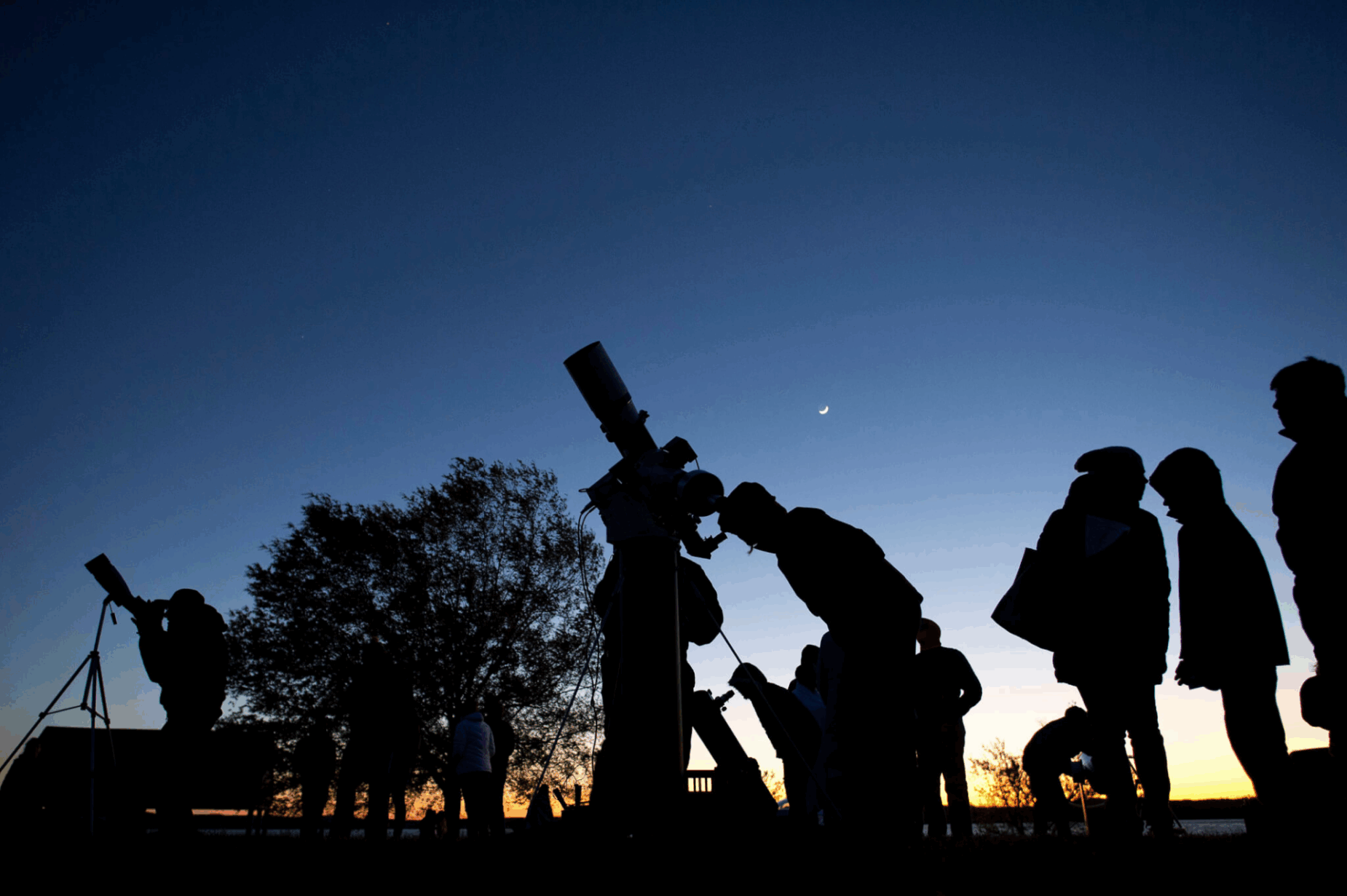Teen Science Cafe | Back to the Geosphere: Impacts of CO2 Sequestration Underground
Morehead Planetarium and Science Center Science Stage 250 E Franklin St, Chapel Hill, North Carolina, United StatesGeological carbon sequestration involves capturing atmospheric CO2, condensing it into liquid form, and pumping it into deep underground aquifers. Scientists have been exploring the environmental impacts of carbon sequestration, including changes to groundwater geochemistry, subsurface microbial community composition, and the potential for fracturing and escape of CO2 back into the atmosphere. I’ll give an overview Read more...
Astronomy Merit Badge Workshop – Boy Scouts
Morehead PlanetariumEarth, Moon and Sun
GSK Fulldome TheaterCosmic Colors
GSK Fulldome TheaterEarthquakes, Volcanoes, and Tsunamis
GSK Fulldome TheaterFrom Earth to the Universe
GSK Fulldome TheaterCarolina Skies
GSK Fulldome TheaterAstronaut
GSK Fulldome TheaterDynamic Earth
GSK Fulldome TheaterCarolina Skies
GSK Fulldome TheaterMagic Tree House Space Mission
GSK Fulldome TheaterGalileo: The Power of the Telescope
GSK Fulldome TheaterWe Are Stars
GSK Fulldome TheaterThe Longest Night: A Winter’s Tale
GSK Fulldome TheaterCarolina Skies
GSK Fulldome TheaterSolar System Odyssey
GSK Fulldome TheaterThe Longest Night: A Winter’s Tale
GSK Fulldome TheaterCarolina Skies
GSK Fulldome TheaterMagic Tree House Space Mission
GSK Fulldome TheaterTake Flight
GSK Fulldome TheaterWe Are Stars
GSK Fulldome TheaterThe Longest Night: A Winter’s Tale
GSK Fulldome TheaterCarolina Skies
GSK Fulldome TheaterSolar System Odyssey
GSK Fulldome TheaterThe Longest Night: A Winter’s Tale
GSK Fulldome TheaterCarolina Skies
GSK Fulldome TheaterUNC Research Spotlight with Tamlin Pavelsky: The NASA SWOT Mission
Morehead Planetarium and Science Center Science Stage 250 E Franklin St, Chapel Hill, North Carolina, United StatesNASA’s Surface Water and Ocean Topography Satellite: A New Eye in the Sky for Earth’s Water Water is perhaps the single most important resource for humans and naturals systems. In the form of floods, it also drives the most destructive category of natural disasters worldwide. Despite its clear importance, there is a huge amount we Read more...
Earth, Moon and Sun
GSK Fulldome TheaterCarolina Skies
GSK Fulldome TheaterTeen Science Cafe: From the Rainforest to the UN: How Science Informs Climate Change Policy
Morehead Planetarium Fulldome Theater 250 E Franklin St, Chapel Hill, North Carolina, United StatesProfessor Angel Hsu found herself in the lowland jungles of Costa Rica while studying abroad the summer after her freshman year at Wake Forest University, experiencing the beauty of glass tree frogs and sound of howler monkeys, but wondering, “What good is the science I'm discovering, if global warming and deforestation eventually lead to the demise of Read more...
Magic Tree House Space Mission
GSK Fulldome TheaterStar Families: Be an Astronaut
GSK Fulldome TheaterWe Are Stars
GSK Fulldome TheaterThe Longest Night: A Winter’s Tale
GSK Fulldome TheaterCarolina Skies
GSK Fulldome TheaterSolar System Odyssey
GSK Fulldome TheaterThe Longest Night: A Winter’s Tale
GSK Fulldome TheaterCarolina Skies
GSK Fulldome TheaterSkywatching: Geminid Showers
Little River Regional Park 301 Little River Park Way, Rougemont, North Carolina, United StatesOne of the best meteor showers of the year – the Geminid meteor shower — will next peak on Tuesday, December 13, 2022. Morehead Planetarium and Science Center and Little River Regional park will host a free skywatching event. Learn about meteors and more! For example, did you know meteors, sometimes misleadingly called “shooting stars,” Read more...
Earth, Moon and Sun
GSK Fulldome TheaterCarolina Skies
GSK Fulldome TheaterMagic Tree House Space Mission
GSK Fulldome TheaterTake Flight
GSK Fulldome TheaterWe Are Stars
GSK Fulldome TheaterThe Longest Night: A Winter’s Tale
GSK Fulldome TheaterCarolina Skies
GSK Fulldome TheaterSolar System Odyssey
GSK Fulldome TheaterThe Longest Night: A Winter’s Tale
GSK Fulldome TheaterCarolina Skies
GSK Fulldome TheaterStarry Nights: Winter Skies
GSK Fulldome TheaterEarth, Moon and Sun
GSK Fulldome TheaterCarolina Skies
GSK Fulldome TheaterMagic Tree House Space Mission
GSK Fulldome TheaterTake Flight
GSK Fulldome TheaterWe Are Stars
GSK Fulldome TheaterThe Longest Night: A Winter’s Tale
GSK Fulldome TheaterCarolina Skies
GSK Fulldome TheaterSolar System Odyssey
GSK Fulldome TheaterThe Longest Night: A Winter’s Tale
GSK Fulldome TheaterCarolina Skies
GSK Fulldome TheaterEarth, Moon and Sun
GSK Fulldome TheaterCarolina Skies
GSK Fulldome TheaterSTEM/Nova Astronomy Workshop – Cub Scouts
Morehead PlanetariumMagic Tree House Space Mission
GSK Fulldome TheaterGalileo: The Power of the Telescope
GSK Fulldome TheaterWe Are Stars
GSK Fulldome TheaterThe Longest Night: A Winter’s Tale
GSK Fulldome TheaterCarolina Skies
GSK Fulldome TheaterSolar System Odyssey
GSK Fulldome TheaterThe Longest Night: A Winter’s Tale
GSK Fulldome TheaterCarolina Skies
GSK Fulldome TheaterEarth, Moon and Sun
GSK Fulldome TheaterCarolina Skies
GSK Fulldome TheaterTeen Science Cafe | The Surprising Life of Honeybees
Morehead Planetarium and Science Center Science Stage 250 E Franklin St, Chapel Hill, North Carolina, United StatesDid you know that you could host a beehive in your backyard or at your favorite local business? Meet Jackson Brinkley, your friendly neighborhood beekeeper at Teen Science Cafe.



